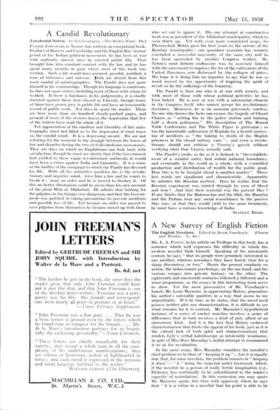Jawaharlal Nehru. An Autobiography. (The Bodley Head. 15a.)
A Candid Revolutionary
PANDIT JAWAHARLAL NEn/C` has written an exceptional book. Product of Harrow and Cambridge and the English Bar, stormy petrel of the Indian political movement, he has been at war with authority almost since he entered public life: That brought him into constant contact with the law and he has spent many months in gaol, where most of this book was written. Such a life would have excused, possibly justified, a tone of bitterness and rancour. )3oth are absent from this most candid of autobiographies. The Pandit does not spare 1 • self in his communing's. Though his language is courteous, he does not spare others, including most of those with whom he worked. If there is harshness in hii judgements, it is chiefly directed against those men classed as Liberals, though many of them have grown grey in public life and have an honourable record of public work. Nor does he spare the reader. There are here more than six hundred closely-packed pages, and perusal of most of the reviews leaves the impression that few
of the writers have read the whole of it. • • Yet appreciation of the candour and liberality of this auto- biography must not blind us to the impression it must leave on the candid mind. It is a depressing record. We are not referring for the moment to the struggle between the forces of law and disorder during the two civil disobedience movements. They are days on which no Englishman can look back with satisfaction, though he must see clearly that if the Government had yielded to these vague revolutionary outbreaks it would have been a crime against India and htunanity. It is a sense of the futility of the campaign to which the Pandit has devoted his life. With all his attractive qualities, his is the revolu- tionary and negative mind. Give him a law and he wants to break it ; issue an order and he is moved to disobey it. Of this no better illustration could be given than his own account of the great Mela at Allahabad. He admits that bathing for the pilgrims in the Ganges was dangerous and that the Govern- ment was justified in taking precautions to prevent accidents and possible loss of life. Yet because an order was passed to save pilgrims from themselves lie became mixed up with those
who set out to ignore it. His one attempt at constructive work was as president of the Allahabad municipality, which he soon threw up. Yet with even more constricted scope, Sir Pherozeshall Mehta gave his best years to the service of the Bombay municipality ; one quondam associate has recently concluded a successful mayoralty of the same city and he has been succeeded by another Congress worker. Mr. 'Nehru's most definite endeavour was -tn. associate- himself siith the movement to improve the lot of the cultivators of the United Provinces sore distressed by the Collapse of prices.
We hope it- is doing him no injustice say that he was as much moved by the opportunity of inspiring the spirit of revolt as by,the sufferings of the tenantry,
The Pandit is then one who is at war with society, and with most of those with whose political activities he has been linked. He is now at war with a substantial element in the Congress itself, who cannot accept his revolutionary doctrines. Moreover, he is on occasion grievously careless. No one who knows the facts can excuse the tragedy of Chauri Chaura as " setting fire to the police station and burning half a dozen policemen." His description of The Round Table Conferences and The White Paper is grotesque ; so too the lamentable suffocation of Moplahs by a horrid success- ion of accidents as " the baking to death of the Moplah prisoners in the closed railway vans " ; and even a revolu- tionary should not criticise a Viceroy's speech without verifying what that Viceroy actually said.
The Pandit's credo, so far as it is defined, is "the establish- ment of a socialist order, first within national boundaries, and eventually in the world as a whole, with a controlled production and distribution of wealth for the public good. How this is to be brought about is another matter." Those last words are significant and characteristic. Apparently he admires the Russian method. Does he realise that the Russian experiment was carried through by men of blood and iron ? And that their material was the patient Slav ? If any thinks that the Mahomedan and the Sikh, the Maratha and the Pathan bear any social resemblance to the passive Slav race, or that they would yield to the same treatment, he must have a curious knowledge of India.
STANLEY REED.






















































 Previous page
Previous page